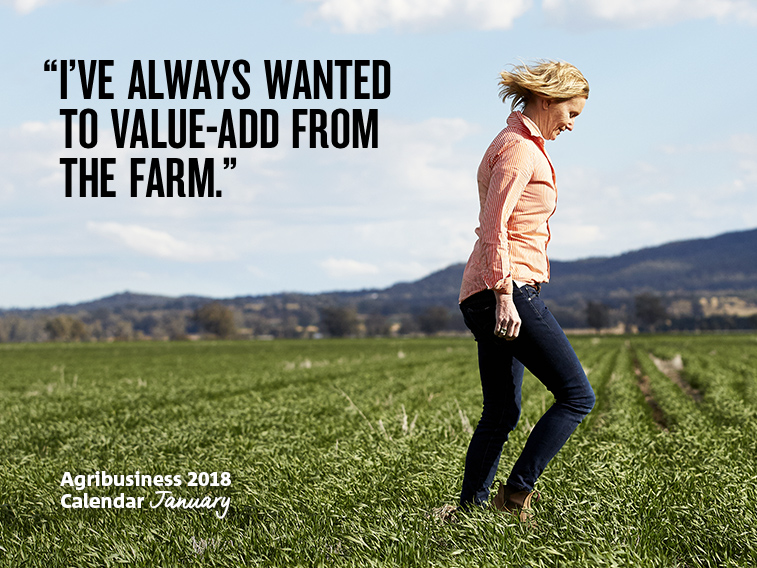Protecting your business online is simpler than you think. NAB Executive Business Direct and Small Business, Krissie Jones, shares practical advice on how you can get started.


Newsletter
After two years of dead-end phone calls to Asian supermarkets, Lively Linseed’s Jacqui and Chris Donoghue overcame the challenges to find direct-export success.

Lively Linseed owes its success to lessons co-owner Jacqui learnt growing up on the family farm on the Breeza Plains in New South Wales.
Her father, Trevor Power, had a vision: to transform his sheep farm into a highly productive, intensive irrigation farm. After going from bank to bank to find a backer, it was NAB that took a risk on him – a risk that paid off. Trevor Power was one of the first to grow cotton on the Breeza Plains, a crop most said couldn’t be grown that far south. This risk-taking entrepreneurial spirit flowed through to his daughter. Jacqui and her husband Chris now manage an inventive value-add agribusiness that uses a pioneering direct-export model from their farm at Mullaley.
“I’ve always wanted to value-add something from the farm,” Jacqui explains. “I would look at a loaf of bread in the supermarket – the farmer is responsible for most of the ingredients and gets the smallest amount of the pie. I thought, ‘There’s got to be something we can value-add from the farm to get closer to the consumer and get more of the pie’.”
Lively Linseed as a stand-alone brand commenced in 2007, selling low volumes of ground linseed mix and linseed biscuits – baked locally in Narrabri, hand-packed by Jacqui, Chris and their children, and sold on market stalls.
Eventually they recognised more products were needed.
“We went to Fine Food in Melbourne and realised we weren’t going anywhere with two products,” Jacqui explains. “We needed to expand the range to gain a larger footprint to attract the attention of potential stockists. I also wanted to deal directly with our stockists for real customer feedback.”
The Donoghues expanded their range to include cereal boosters, which are ground linseed mixed with organic dried fruits. They also produce a gluten-free linseed biscuit.
Rather than engaging a distributor to develop the business quickly, the couple preferred slower growth, by establishing close, direct relationships.
“I wanted to carefully manage our business growth to avoid the pitfalls many start-ups have of growing too quickly,” Jacqui says. “I just wanted to control where it was.”
In 2008, Lively Linseed won a silver medal in the cereal category of the Sydney Royal Fine Food Show, making its mark on the fine food market.
Then a large supermarket chain rang.
Jacqui explains: “One of the larger supermarkets did the hard sell. They said, ‘We’ve got a large number of stores. You ship to one location, you get one invoice.’ In the end I said no, because we’re a family business and I wanted to support other family businesses that had a food offering you perhaps couldn’t get in the larger supermarkets. All these little fruit and veggie stores and gourmet food providers that we were targeting because they were just like us – family businesses, wanting to offer a quality product, farm fresh. This is the difference.”
The low prices of Lively Linseed’s products mean high volumes are important, so export to boutique overseas supermarkets was a natural next step.
Jacqui chose Asia as the focused export destination, due to the convenient time zone (as a morning person, she likes to catch people at the beginning of their day) and relatively short shipping time. Impressively, Jacqui also taught herself Mandarin.
She shares her breakthrough moment.
“I searched online and found a supermarket that serviced high-end, wealthy Chinese who could afford to purchase quality Australian produce. They operate in Hong Kong, a little bit in mainland [China] and Taiwan. I called for two years but I wasn’t getting anywhere.”
Despite meeting “many brick walls along the way”, Jacqui didn’t give up.
“It was coming up to Chinese New Year, and I sent the supermarket buyer a message – without anything about the product – just wishing them a Happy Chinese New Year, in Mandarin. Within half an hour I had an order.”
Jacqui says that social media is important in Asia to gain repeat sales, so she joined WeChat and Weibo to connect with consumers.
“I usually post stuff about the farm,” she explains. “Actually, the largest number of hits I got was when I was jogging one morning, and I took a photo of the farm. I wrote, ‘I was jogging this morning and I saw lots of snake tracks on my way. Maybe that’s a sign of rain because we really need rain on our farm here in Australia.’ They just went crazy – click, click, click.”
Jacqui’s advice to other agribusinesses seeking to export into Asia is to be patient and persistent and aware of the culture.
“In Asia, patience is the key. Patience and persistence. You’ve got to be agile and make sure you keep on top of their holidays.”

In 2017, Lively Linseed exhibited at Food Hotel China and Gulfood, the biggest food expo in the world. The Donoghues are soon planning to sign with a supermarket chain throughout the Middle East and India from that exhibition.
“I’m on a steep learning curve about all things from that part of the world,” Jacqui says. “I’ve just learnt the name for the feast that follows Ramadan, Eid al-Fitr. It amazes me, really. I haven’t travelled very much and this is sort of like travel. You learn about these people’s lifestyles, and customs.”
© National Australia Bank Limited. ABN 12 004 044 937 AFSL and Australian Credit Licence 230686.